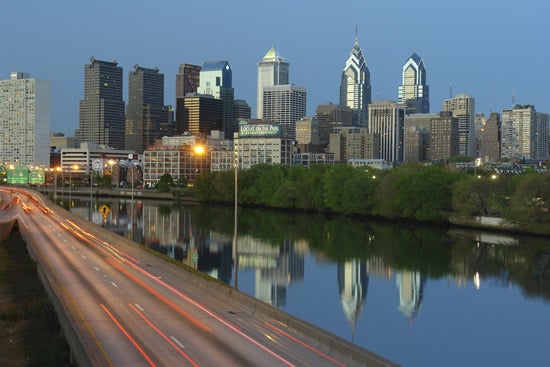Given the sad state of our economy, the bad investment climate, and the danger posed by profligate federal spending and ever-increasing government regulation, American entrepreneurs have to plan very carefully about where to locate new plants, stores, and other facilities when they expand an existing business or start a new one. If you are a business owner facing such a decision, here are 10 places where you should not invest your money or locate your business:
- Philadelphia,
- California,
- West Virginia,
- South Florida,
- Madison County, Illinois,
- St. Clair County, Illinois,
- McLean County, Illinois,
- New York City,
- Albany, New York,
- Clark County, Nevada.
And you should seriously reconsider doing any business in Cook County, Illinois; southern New Jersey, including Atlantic County; Franklin County, Alabama; Smith County, Mississippi; the federal Eastern District of Texas; and Louisiana.
The first 10 locations won the dubious distinction of being the worst “Judicial Hellholes” in the nation, according to the American Tort Reform Association’s (ATRA) annual ranking, and the others are on ATRA’s “Watch List.”
ATRA is made up of businesses and trade associations from all over the country. They represent the business heartbeat of America—the small, medium, and large companies that provide the jobs and employment that power our economy and have long given us one of the highest standards of living in the world. Unfortunately, the viability of our economy is threatened by an out-of-control tort system that fills the pockets of trial lawyers and has forced entire industries into bankruptcy.
ATRA ranks the worst places to be sued because of the liability risks in local courts that “are radically out of balance.” These are places where, as infamous Mississippi trial lawyer (and now felon) Dickie Scruggs said, “the judiciary is elected with verdict money [from trial lawyers]…and it’s almost impossible to get a fair trial if you’re a defendant.… Any lawyer fresh out of law school can walk in there and win the case, so it doesn’t matter what the evidence or law is.”
As a former in-house corporate lawyer, I have extensive, first-hand experience with these types of jurisdictions. They were places where it didn’t matter if your business had actually done anything wrong or broken the law. That was not necessary for a large, unfair, and completely unjustified verdict to be awarded against you for a money judgment that would hurt your shareholders and enrich the local trial bar and undeserving plaintiffs.
Some of the stories from the “hellholes” list should scare any average business owner. The liability rules are so expansive in New York City that lawsuits against the city alone cost taxpayers over $500 million annually. These rules also affect private businesses, such as a photography studio that was sued by a groom who didn’t like his wedding photographs and wanted the studio to pay for recreating the wedding after a divorce, or the burger customer who sued White Castle because he could not fit into its booths. (He weighed 290 pounds.)
Philadelphia is a venue-shopping jurisdiction where lawyers practice litigation tourism. It is a magnet for mass-tort litigation, including cases against pharmaceutical companies. The chief judge actually undertook a “public campaign to lay out the welcome mat for increased mass torts filings.” She wanted to take “away business from other courts.”
Judges in Clark County, Nevada, refused to let jurors learn about the unsanitary, illegal practices at a health clinic that led directly to a hepatitis outbreak when patients sued the drug maker of an anesthetic they received. That evidence would obviously have let the jury know that the local clinic, not the deep-pockets drug maker, was responsible for what had happened.
Lawyers in McLean County, Illinois, are making a fortune on dubious asbestos lawsuits, including a $90 million verdict against a company whose product had not even injured the plaintiff. The courts there have allowed such cases to go forward based on the novel legal theory of “parallel conduct,” which claims that companies that made the same product, even if was not used by the plaintiff, are still responsible for their share of injuries caused by a defective product. One judge even banned Honeywell from presenting a defense, telling a jury that all it could do was determine the amount of damages.
Smith County, Mississippi, made the watch list because of the largest single-plaintiff asbestos verdict in U.S. history: $322 million. The judge did not disclose that his parents had previously settled an asbestos claim against one of the defendants in the case before him and that his father had a pending claim in another court.
According to ATRA, Louisiana, which receives huge amounts of revenue from energy companies, has now developed a cottage industry of lawsuits against those same companies “replete with unsubstantiated claims of environmental contamination.”
These kinds of abuses make the U.S. tort system the most expensive in the world and return the least amount of money to individuals who are truly injured. The cost and risk of a state’s tort system is one of the most important factors in business development. Reform is a key to attracting new investments and spurring the expansion of existing businesses.
States that don’t reform their system to eliminate such judicial hellholes are hurting their citizens and damaging their economies. They are guaranteeing that they will have lower wages, higher prices, decreased return on investments, less access to health care, and less innovation in comparison to states that provide predictable, fair, and efficient court systems that protect both businesses and injured parties.



























